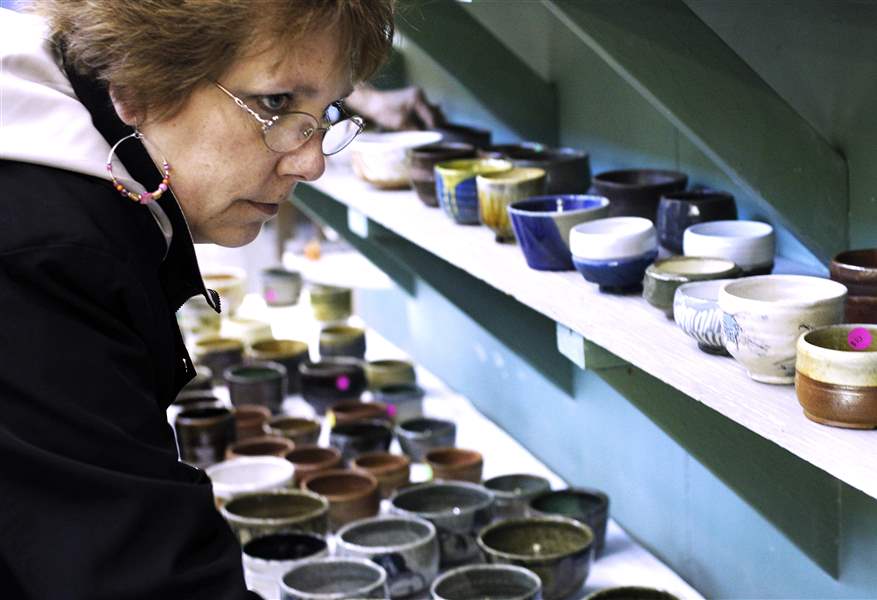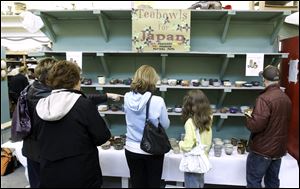
Sales of tea bowls to aid potters who lost their livelihood
BGSU students aid japan's disaster victims
4/22/2011
Debbie Lowery of Bradner, Ohio, looks over some of the bowls for sale.
The Blade/Andy Morrison
Buy This Image

Ceramic tea bowls, made in the style of Japanese tea bowls, are offered for sale by Bowling Green State University ceramics students. Proceeds will be sent to the Mashiko Potters Fund in northern Japan.
BOWLING GREEN -- Jessica Davis isn't so sure the Japanese tea bowls that ceramics students at Bowling Green State University are selling will be used for drinking tea, but she does know the proceeds will go to a good cause.
Every dollar taken in from the ceramics department's "Tea Bowls for Japan" sale will be donated to the Mashiko Potters Fund, which was set up in the wake of the deadly March 11 earthquake in Japan. Homes, workshops, and kilns in the ceramics center at Mashiko in northern Japan were left badly damaged.
"They're selling like hotcakes," Ms. Davis, a senior painting major from New Knoxville, Ohio, said Thursday during the first day of the BGSU Clay Club's 15th annual Spring Ceramics Sale in the Fine Arts Building.
The sale continues from 10 a.m. to 9 p.m. Friday. After that, the tea bowls will be sold Monday at the Bowen-Thompson Student Union and Wednesday at the "Hump Day Revue" at Grumpy Dave's Pub on South Main Street.
The event is just one of several fund-raising events planned in the Toledo area some six weeks after the earthquake and tsunami.
From 1 p.m. to 6 p.m. Friday and Saturday, the University of Toledo Japanese Student Association and the Japanese Association of Toledo are holding "A Thousand Cranes: Japan Tsunami Relief Fund-raiser" in the food court at Westfield Franklin Park mall. The event is being coordinated by Mance Thompson, a Tokyo resident who is staying with his parents in Toledo after leaving Japan "when radiation got crazy and the U.S. government started doing voluntary evacuations."

Debbie Lowery of Bradner, Ohio, looks over some of the bowls for sale.
Mr. Thompson said he wanted to do something to help the Japanese relief effort and also raise awareness about the culture of his adopted country. Both days, there will be dance performances, martial arts demonstrations, a tea ceremony, children's activities, and, of course, origami crane folding. For $1, participants can buy an origami crane or learn how to make one.
Mr. Thompson said the name of the event derives from the well-known story of Sadako Sasaki, a young girl who developed leukemia after the atomic bomb was dropped on her hometown of Hiroshima.
She tried to make 1,000 cranes from her nursing home bed to fulfill a Japanese saying that one who created 1,000 origami cranes would be granted a wish.
"Every Japanese person knows the story," Mr. Thompson said, explaining that when disaster or illness strike, friends and families "will fold cranes to tell you to get better or get well."
In Bowling Green, BGSU ceramics instructor Joe Pintz said he got the idea for "Tea Bowls for Japan" while visiting a gallery in Boston that specializes in Japanese pottery. There he learned about the Mashiko Potters Fund, and saw pictures of the broken kilns - a devastating blow to the 400 or so potters in the community who make pottery for a living.
"It's a small industry there. To lose their kilns and workshops is to lose their livelihoods," he said.
Students who chose to participate in the tea bowl project got together on a recent Sunday afternoon to create about 300 of the handmade ceramic bowls, which are used in Japan as part of ritualized tea ceremonies.
While highly collectable - and often very expensive - in Japan, the students' tea bowls are selling for an affordable $10 to $15.
"You could use them for drinking cups, whiskey cups," Ms. Davis suggested. "I'm not sure what they'd necessarily be used for in a college town."
Contact Jennifer Feehan at: jfeehan@theblade.com or 419-724-6129.